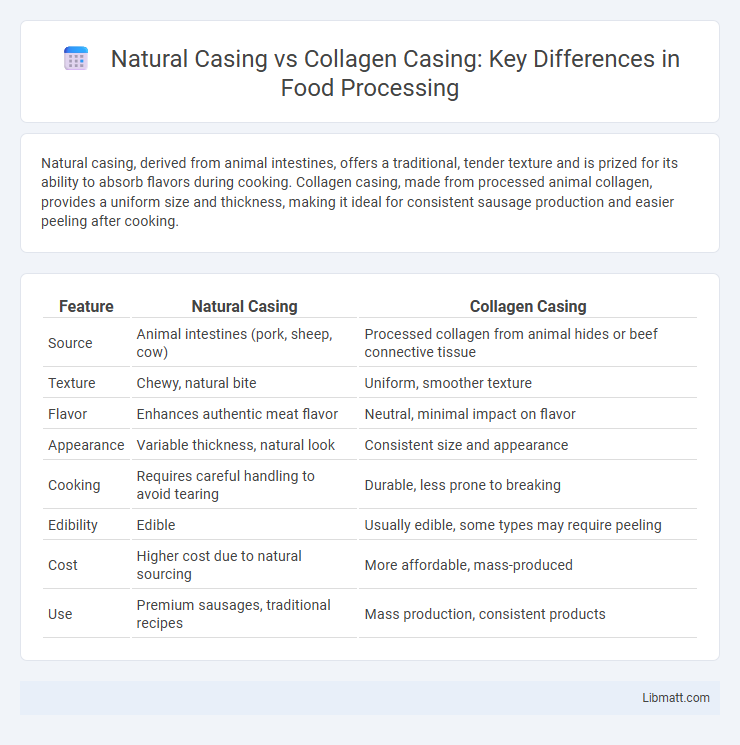Natural casing, derived from animal intestines, offers a traditional, tender texture and is prized for its ability to absorb flavors during cooking. Collagen casing, made from processed animal collagen, provides a uniform size and thickness, making it ideal for consistent sausage production and easier peeling after cooking.
Table of Comparison
| Feature | Natural Casing | Collagen Casing |
|---|---|---|
| Source | Animal intestines (pork, sheep, cow) | Processed collagen from animal hides or beef connective tissue |
| Texture | Chewy, natural bite | Uniform, smoother texture |
| Flavor | Enhances authentic meat flavor | Neutral, minimal impact on flavor |
| Appearance | Variable thickness, natural look | Consistent size and appearance |
| Cooking | Requires careful handling to avoid tearing | Durable, less prone to breaking |
| Edibility | Edible | Usually edible, some types may require peeling |
| Cost | Higher cost due to natural sourcing | More affordable, mass-produced |
| Use | Premium sausages, traditional recipes | Mass production, consistent products |
Introduction to Sausage Casings
Natural casings, derived from the intestines of animals such as pigs, sheep, and cows, offer a traditional texture and flavor that many sausage makers and consumers prefer. Collagen casings, made from processed animal hides and tendons, provide uniformity, ease of use, and consistent sizing, making them ideal for commercial sausage production. Your choice between natural and collagen casings impacts the final product's bite, appearance, and cooking behavior, influencing the overall sausage quality.
What Are Natural Casings?
Natural casings are derived from the intestines of animals such as hogs, sheep, and cattle, providing an edible and traditional sausage casing. They offer superior permeability and elasticity, allowing smoke and moisture to pass through during curing and cooking, which enhances flavor and texture. Preferred by artisanal sausage makers, natural casings create a distinctive snap and authentic appearance that synthetic or collagen casings typically lack.
What Are Collagen Casings?
Collagen casings are edible, uniform, and manufactured from purified collagen proteins derived primarily from bovine or porcine sources. These casings offer consistent thickness and size, making them ideal for industrial sausage production and ensuring even cooking and reliable texture. Unlike natural casings, collagen casings provide greater control over sausage shape and can be customized to specific requirements in flavor and firmness.
Production Process: Natural vs Collagen Casings
Natural casings are derived from the cleaned intestines of animals such as pigs, sheep, or cattle, undergoing a meticulous washing and salting process to preserve their texture and flavor. Collagen casings are produced through a controlled process that extracts collagen from bovine or porcine hides, followed by forming, drying, and sterilization to ensure uniformity and durability. Your choice between natural and collagen casings depends on the desired product characteristics and production scalability.
Appearance and Texture Differences
Natural casings have a translucent, irregular appearance with a slightly rough texture that contributes to a traditional, artisanal look, while collagen casings offer a uniform, smooth surface with consistent thickness. The elasticity of natural casings results in a firmer snap when bitten, enhancing the sensory experience, whereas collagen casings produce a more pliable and mild bite. These differences impact the final product's visual appeal and mouthfeel, influencing consumer preference in sausage production.
Flavor Impact: Natural vs Collagen
Natural casings, derived from animal intestines, impart a distinct, savory flavor that enhances the overall taste profile of sausages, maintaining a traditional and authentic eating experience. Collagen casings, made from processed animal proteins, offer a more neutral flavor, allowing the seasoning of the sausage itself to stand out without adding complexity. Flavor impact is a key consideration for artisans and commercial producers aiming to balance authenticity with consistency in sausage production.
Cooking Performance and Handling
Natural casing offers superior cooking performance with excellent moisture retention and a traditional snap that enhances texture, while collagen casing provides consistent heat resistance and easier handling during production. Your choice impacts the final sausage quality; natural casing tends to shrink and cook unevenly, whereas collagen casing ensures uniform cooking and simplified stuffing. Selecting the right casing depends on balancing cooking control with desired mouthfeel and processing efficiency.
Shelf Life and Storage Considerations
Natural casings, made from animal intestines, have a shorter shelf life typically lasting up to 30 days when refrigerated and require careful handling to prevent spoilage. Collagen casings, derived from processed animal collagen, offer a longer shelf life, often several months when stored in a cool, dry place, and provide more consistent quality and ease of storage. Proper refrigeration of natural casings and dry, cool storage for collagen casings are essential to maintain their integrity and prevent microbial growth.
Cost Comparison of Natural and Collagen Casings
Natural casings, typically derived from animal intestines, tend to be more expensive due to their labor-intensive processing and variability in size and quality. Collagen casings, manufactured from purified collagen proteins, offer a cost-effective alternative with consistent sizing and lower production costs. The price difference can impact large-scale sausage production budgets, making collagen casings a preferred choice for manufacturers prioritizing uniformity and cost efficiency.
Choosing the Right Casing for Your Sausage
Natural casings, made from animal intestines, offer a traditional texture and flavor that enhances sausage authenticity and bite. Collagen casings, derived from connective tissue, provide consistent size, easy handling, and uniform cooking ideal for commercial sausage production. Your choice depends on whether you prioritize artisanal quality with natural casings or efficiency and uniformity with collagen options.
natural casing vs collagen casing Infographic

 libmatt.com
libmatt.com